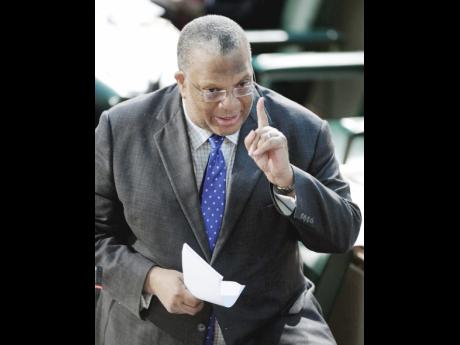High cost to economy of not reducing wage bill
The costs to the Jamaican economy of failing to contain the public sector wage bill to the nine per cent of gross domestic product (GDP) targeted by the Government are likely to be high, according to the International Monetary Fund (IMF).
Options to offset the additional wage expense would then be limited to undesirable policy choices of either compressing non-wage primary spending, including capital spending at a time when growth is weak, or raising additional revenue, it said.
In its September 2015 country report, the IMF said its staff which undertook the ninth-quarterly review of Jamaica's economic support programme in August, as well as the Jamaican authorities, have agreed on the critical need to accelerate efforts to constrain the size and remuneration of the civil service and to undertake a comprehensive reform of the public sector to modernise the civil service and enhance the delivery of public services.
It said that risks to the four-year programme, now in its third year, remain high. Notwithstanding the Jamaican authorities' demonstrated resolve in implementing the programme, it said, more tangible signs of improvements in growth and job creation will be important to sustain the social consensus needed to continue on the reform trajectory.
The report said that revenue shortfalls or the inability to contain the government wage bill could undermine the fiscal position.
In addition, it said an eventual reopening of the domestic bond market may prompt an upward shift in the yield curve and undermine financial sector stability.
The report also said that the run-up to elections which should be held before end-2016, could potentially delay progress on programme implementation and reform momentum.
Noting that Jamaica's public sector wage bill remains high and poses an important challenge for fiscal policy, the report pointed out that the government earlier this year signed a two-year wage agreement with the Jamaica Confederation of Trade Unions (JCTU), a confederation of 12 unions, and with the Jamaica Teachers' Association (JTA), covering 80 per cent of all public-sector employees.
bargaining units
Negotiations are continuing with the other public sector unions, including bargaining units for health sector workers and the police, and the Government said it is committed to finalising agreements with them in the coming months.
According to the IMF report, based on the benchmark agreement with the JCTU and JTA, the wage bill is projected at 10.1 per cent of GDP in fiscal year 2015/16. The estimated bill assumes a general increase in compensation by J$4,000 per person per month in the fiscal year, three per cent increase in fiscal year 2016/17, 2.5 per cent merit increases for each year, and unchanged employment levels.
According to the 2015/16 Fiscal Policy Paper tabled by Finance and Planning Minister Dr Peter Phillips in Parliament in February, the allocation for wages and salaries of $161.7 billion for fiscal year 2014/15 represented the largest share of the non-debt expenditure budget, accounting for 52.7 per cent, a marginal reduction from the 54.8 per cent the previous fiscal year. That provision amounted to 10 per cent of GDP, down from 10.6 per cent in 2013/14.
Meeting this target
For fiscal year 2015/16, wages and salaries as a share of non-debt recurrent expenditure are projected at $165.2 billion or 55 per cent.
The IMF report said that for fiscal year 2016/17, the Government remains committed to lowering its wage bill to nine per cent of GDP.
"Meeting this target, however, would require measures for 0.4 per cent of GDP," it said. "Current measures under consideration, including through attrition and voluntary separation, may need to be supplemented by additional reform measures to modernise the public sector and transition towards a smaller and more efficient civil service," it added.
The Government said it will continue to reduce the size of the public sector over the period 2014 to 2016 through the elimination of posts and an attrition programme. To meet the Government's overall wage ceiling of nine per cent of GDP by 2016/17, the filling of vacant positions will be constrained as needed, guided subject to the need to preserve capacity in a limited number of priority areas.
"Our authorities are cognisant of the potential risks stemming from overruns in the wage bill, which could further squeeze already insufficient growth-enhancing public capital expenditures," the report said.
It said the recently concluded wage agreements are part of a broader strategy of civil service reform and public sector modernisation designed to enhance the delivery of public services.

